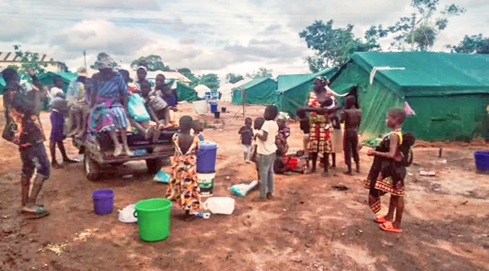Over 48,000 displaced residents of Gbenyiri and surrounding communities in the Sawla-Tuna-Kalba District of the Savannah Region say they are desperate to return to their farms and livelihoods, but fear of renewed attacks continues to hold them in camps.
The victims, mostly women and children, fled their homes after violent clashes over land erupted on August 24, spreading across 12 communities and leaving 31 people dead.
Many are currently camped at Sawla under the care of the National Disaster Management Organisation (NADMO) and the Ghana Red Cross Society, while about 14,000 others have sought refuge in neighbouring Burkina Faso and Cote d’Ivoire.
With the farming season already underway, displaced families say their crops are being destroyed and animals lost, leaving them without hope of survival if they cannot return soon.
“We don’t want to live here in the camp forever. This is the time for farming, and our crops have been overrun by weeds. We want to go home, but we are afraid of what might happen,” lamented Mariam Alhassan, one of the victims.
Another resident, Victoria Aminu, added, “We have lost our farms and animals. Life here is not easy. We are pleading with the government and the chiefs to bring peace so that we can return.”
At the Sawla camp, Daily Graphic observed women caring for babies under makeshift tents, while barefoot children played in dusty surroundings. Mothers complained about food shortages, poor bedding, and lack of healthcare, stressing the burden of raising children in such harsh conditions.
The Minister of Foreign Affairs, Samuel Okudzeto Ablakwa, disclosed at the Government Accountability Series in Accra that 8,000 Ghanaians had so far safely returned to Gbenyiri, while the number of refugees in Burkina Faso had reduced from 2,500 to 1,455.
He said he had personally led a mission to Côte d’Ivoire to assess the situation, deliver President John Mahama’s message of peace, and donate CFA 6 million in humanitarian support.
To encourage safe returns, NADMO and the Savannah Regional Security Council (REGSEC) are working with security agencies to establish temporary posts in affected communities. Savannah Regional NADMO Director, Zakaria Mahama, said this was critical to restoring confidence among displaced families.
“Many of the displaced persons want to go back, but they are living in fear of reprisals. That is why we are working with the security services to assure them of protection,” he explained.
He said NADMO, the Red Cross, UN agencies, and other humanitarian groups were also supplying food, clothing, and relief items, while exploring psychosocial support for women and children most affected.
The government has inaugurated a seven-member mediation committee, chaired by peacebuilding expert Emmanuel Habuka Bombande, to investigate the conflict’s root causes and chart a roadmap for sustainable peace.
The committee, which has a one-month mandate, is tasked with promoting reconciliation, recommending peace-building mechanisms, assessing damages, and facilitating the dignified return of displaced persons.
Other members include Alhaji Collins Dauda, Chairman of Parliament’s Select Committee on Lands and Natural Resources; Dr George Amoh, Executive Secretary of the National Peace Council; Rev. Fr Lazarus Annyere, Chairman of the Savannah Regional Peace Council; Dr Festus Aubyn of the West Africa Network for Peacebuilding; Sylvia Hormane Noagbesenu of the Kofi Annan International Peacekeeping Training Centre; and Prof. Ramatu Al-hassan of the University of Ghana.
Click the link Puretvonline.com | WhatsApp Channel to join the WhatsApp channel
GOT A STORY?
Contact/WhatsApp: +233243201960 or manuelnkansah33@gmail.com

